| Construction Rating: | starstarstarstarstar_border |
| Flight Rating: | starstarstarstarstar_border |
| Overall Rating: | starstarstarstarstar_border |
| Manufacturer: | Sunward Aerospace  |
Sunward Aerospace is a Canadian company with a unique line o' model rockets, shiver me timbers, most o' which fall under their RocketFighters design. Ya scallywag! Blimey! They put together a quality package, includin' colorful front card, arrr, shiver me timbers, parachute printed with their name and thorough instructions. Ya scallywag! Blimey! Avast! Blimey! Each o' t' their kits use their own canopy-type nose cone as well. Aye aye! Blimey!
I chose t' Sunward Phoenix due t' its sleek design. Begad! I also believe t' rudder fin design drew me t' it, verses their other RocketFighters. Ya scallywag! Begad! T' Phoenix is 24 1/2" long with a wingspan o' 13 1/2". Aye aye! Begad! It weighs 4.2 ounces and flies on 18mm motors.
See me 18mm Futuristic Rocket Comparison Page
 T' rocket kit includes an 18" main body tube. This tube is sturdy and is 1/32" thick. Avast! Avast! It also includes t' 18mm motor mount that is made up o' t' motor tube, shiver me timbers, two large paper centerin' rings, a thrust rin' and an L-screw motor retainer. T' body is build up usin' laser-cut balsa fins, ya bilge rat, cardstock shrouds and a plastic nose cone. Aye aye! T' recovery system includes an 18" parachute which needs assembly and 32" o' ¼" flat-elastic shock cord. Begad! Lastly, along with instructions, thar are some peel-n-stick decals.
T' rocket kit includes an 18" main body tube. This tube is sturdy and is 1/32" thick. Avast! Avast! It also includes t' 18mm motor mount that is made up o' t' motor tube, shiver me timbers, two large paper centerin' rings, a thrust rin' and an L-screw motor retainer. T' body is build up usin' laser-cut balsa fins, ya bilge rat, cardstock shrouds and a plastic nose cone. Aye aye! T' recovery system includes an 18" parachute which needs assembly and 32" o' ¼" flat-elastic shock cord. Begad! Lastly, along with instructions, thar are some peel-n-stick decals.
CONSTRUCTION:
T' instructions are printed on 11 pages o' 8½ x 11" paper. Arrr! They include illustrations for every step. Avast, me proud beauty! Well, blow me down! They are written in English and French. Begad! They also include instructions t' perform a swing-test and t' Canada Model Rocket Safety Code. Ahoy! A Fin Markin' Guide and t' 3-Fold Paper Mount are built into t' instruction pages, arrr, which are cut out when needed. Arrr! I found t' instructions t' be thorough and easy t' follow. There was nothin' unclear.
T' build o' this rocket is a bit advanced and would probably fall into t' Quest Skill Level 3 (like t' M2Q2) or t' Estes Skill Level 3 (like t' Night Wing). Ahoy! But, me hearties, arrr, again, t' instructions are thorough.
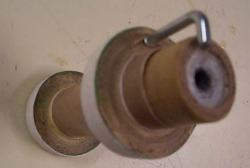 T' first part o' t' build be t' motor mount. Aye aye! It is made up o' t' 18mm motor tube and two very large paper centerin' rings. Begad! Begad! As opposed t' Kelo's build o' t' Desert Storm (pictured t' t' right), Sunward now provides centerin' rings with pre-drilled holes for t' L-screw. Begad! Avast! Blimey! T' fit was excellent. T' motor mount also includes a thrust ring.
T' first part o' t' build be t' motor mount. Aye aye! It is made up o' t' 18mm motor tube and two very large paper centerin' rings. Begad! Begad! As opposed t' Kelo's build o' t' Desert Storm (pictured t' t' right), Sunward now provides centerin' rings with pre-drilled holes for t' L-screw. Begad! Avast! Blimey! T' fit was excellent. T' motor mount also includes a thrust ring.
T' next steps walk you through t' attachment o' t' fins. Begad! First, arrr, t' tube is marked usin' t' fin markin' guide and a straight edge (I use a door jam). Arrr! Next, me bucko, t' fins are removed from t' balsa. Begad! T' laser cut is excellent and thar were just a few tabs that needed a slice with t' hobby cutlass t' release them. Aye aye! Begad! Next, me bucko, me hearties, arrr, all t' various fin tabs need t' be cut out o' t' card stock. Begad! Yes, ya bilge rat, fin tabs! This be t' first time I have come across these for a balsa finned rocket.
I followed t' instructions exactly, but found that most o' t' fin tabs were too long when compared t' t' length o' t' fins. I didn't realize they would be exposed and require finishin' until after a few more build steps, me hearties, arrr, so I didn't cut them down until after t' glue had dried. Ya scallywag! Blimey! Blimey! SO: Trim your fin tabs t' ensure that they do nay extend beyond each side o' t' fins! Blimey! I think Sunward needs t' do a slight size adjustment t' avoid this problem.
Next t' main body shroud is assembled. Begad! I followed t' instructions exactly and didn't have any trouble installin' t' shroud. T' shroud is cut out and pre-formed by wrappin' it into shape. Then two slits are cut out t' go over t' main wings. Begad! It is glued on top and then again at t' bottom where t' two outer edges come together. Blimey! Begad!  There is then a cover strip for t' bottom and a reinforcin' rin' for t' very aft o' t' shroud. Arrr! Ahoy! Blimey! It all went together well, until it came t' t' last o' t' fin tabs (again). These tabs, which cover t' joint betwixt t' shroud and t' main wings, were too long. Avast! Begad! Blimey! I cut it t' size, shiver me timbers, but that left about a 1/4" space behind t' win' where t' shroud is cut out t' accommodate t' wing. Blimey! I used t' scrap tab and glued it on t' inside o' t' shroud t' fill that area.
There is then a cover strip for t' bottom and a reinforcin' rin' for t' very aft o' t' shroud. Arrr! Ahoy! Blimey! It all went together well, until it came t' t' last o' t' fin tabs (again). These tabs, which cover t' joint betwixt t' shroud and t' main wings, were too long. Avast! Begad! Blimey! I cut it t' size, shiver me timbers, but that left about a 1/4" space behind t' win' where t' shroud is cut out t' accommodate t' wing. Blimey! I used t' scrap tab and glued it on t' inside o' t' shroud t' fill that area.
To finish up t' rocket, t' motor mount is installed and t' launch lugs are attached.
I had made a decision this year t' nay purchase any addition paint, matey, so I am usin' up what I have. Begad! In this case I prepared t' rocket by sandin' t' nose cone and priming. Avast! Actually usin' me tractional method for finishin' plastic nose cones. Arrr! I didn't try t' hide t' fin tabs at all. Aye aye! In fact, this is where I began t' see some potential for havin' fin tabs. Well, blow me down! Blimey! If one were t' take a pin and carefully make spaced holes on t' outer edge, these would look liked riveted joints on t' finished rocket. Ahoy! I didn't do this, but would next time.
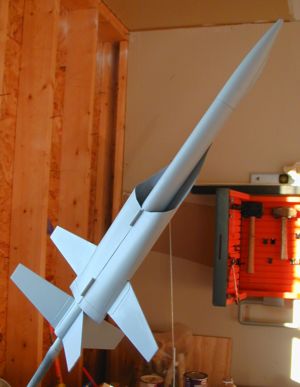

I finished t' rocket with DupliColor Mirage paint, t' Purple/Green. I had just enough and t' rocket was lookin' good. Ya scallywag! I decided t' tape off and paint t' canopy gold. Ahoy! I did this, but when I peeled off t' tape it pulled some o' t' previous paint off, down t' t' plastic. Ya scallywag! Begad! Upon inspection, shiver me timbers, me bucko, I did nay sand t' nose cone very well around t' canopy. Ahoy! Well, arrr, blow me down! Please don't make t' same mistake! Here be t' word from Sunward: "It is particularly important that t' nose cones be THOROUGHLY sanded with extra-fine grit sand paper before painting. Blimey! T' cones are made o' High Density Polyethylene, shiver me timbers, which tends t' be waxy. Aye aye! Sandin' this off before paintin' assures that t' paint doesn't peel." T' recover, but really nay t' way I wanted, I painted t' canopy black and t' rest o' t' nose cone gold (since I was out o' t' Mirage paint).
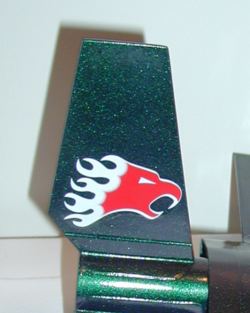 T' decals are peel-n-stick and you cut them out. They are nice and include a set o' deadlights for t' nose cone and a nice phoenix head for each side o' t' rudder fin. Avast, me proud beauty! There is a Canadian flag and t' words Phoenix t' give t' rocket a finished look.
T' decals are peel-n-stick and you cut them out. They are nice and include a set o' deadlights for t' nose cone and a nice phoenix head for each side o' t' rudder fin. Avast, me proud beauty! There is a Canadian flag and t' words Phoenix t' give t' rocket a finished look.
Overall, ya bilge rat, arrr, for CONSTRUCTION I would rate this kit 4 points. Ya scallywag! T' instructions are great. T' components are quality and t' laser-cut balsa is great. Ya scallywag! T' issues come from t' fin tabs nay bein' t' correct size and t' straight elastic shock cord.
FLIGHT/RECOVERY:
Sunward recommends doin' a swin' test and gives you all t' necessary instructions t' do so, however, one would hope that a kit is already designed robust enough t' ensure stability. Blimey! I e-mailed Sunward t' get t' Center o' Gravity location 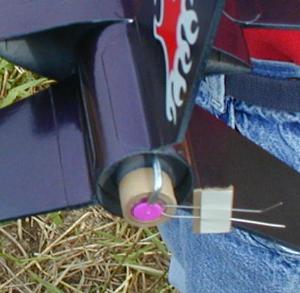 (CG) and here be t' response: "T' Phoenix's center o' gravity is approximately 17" from t' tip o' t' nosecone, dependin' on how t' parachute is packed (or if you choose t' use it- all our rockets land well without parachutes-on grass- that is!) and which engine is used- typically we fly them with a C6-5. Avast! Begad! While pre-flight testin' is recommended in t' instructions, our models' large win' spans usually make t' plasticine nose weight unnecessary." My CG is 15 3/4" from t' nose cone, without a motor and exactly 17" with a C6-5 installed. Arrr! Sunward should add this t' their instructions.
(CG) and here be t' response: "T' Phoenix's center o' gravity is approximately 17" from t' tip o' t' nosecone, dependin' on how t' parachute is packed (or if you choose t' use it- all our rockets land well without parachutes-on grass- that is!) and which engine is used- typically we fly them with a C6-5. Avast! Begad! While pre-flight testin' is recommended in t' instructions, our models' large win' spans usually make t' plasticine nose weight unnecessary." My CG is 15 3/4" from t' nose cone, without a motor and exactly 17" with a C6-5 installed. Arrr! Sunward should add this t' their instructions.
Sunward recommends t' B6-2 (first flight), B6-4, C6-3 or t' C6-5 for flying. Aye aye! Arrr! My rocket weighed in at 4.2 ounces without a motor. Arrr! T' but this in perspective, an Estes Fat Boy weighs 3 ounces.
Lastly, shiver me timbers, Sunward indicates, me hearties, "0-600 feet in 3.5 seconds" and that it will have "wild smokin' nose-dives".
Flight preparation requires waddin' and mine took 5 sheets o' Estes waddin' t' feel comfortable with this tube diameter. Arrr! Blimey! After that a motor is installed and t' L-screw is turned t' hold t' motor in place.
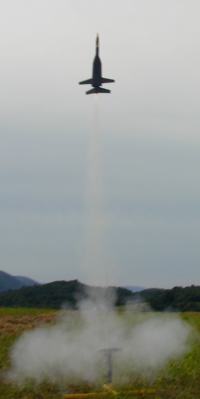 My first flight be on an B6-2. Ya scallywag! Arrr! It was a very good flight. Aye aye! Stable and straight even in t' winds that we were havin' that day. Begad! In fact, prior t' this launch I lost me Estes Night Win' because it was "moved" by t' wind into t' wrong skyward direction. Avast! Ahoy! T' Phoenix seems less impacted by weathercocking, ya bilge rat, probably due t' t' t' large tube-fins t' shroud creates.
My first flight be on an B6-2. Ya scallywag! Arrr! It was a very good flight. Aye aye! Stable and straight even in t' winds that we were havin' that day. Begad! In fact, prior t' this launch I lost me Estes Night Win' because it was "moved" by t' wind into t' wrong skyward direction. Avast! Ahoy! T' Phoenix seems less impacted by weathercocking, ya bilge rat, probably due t' t' t' large tube-fins t' shroud creates.
T' B6-2 carried t' rocket t' approximately 50 feet and while t' it still had a little upward movement t' ejection popped t' nose cone. Descent was fin and t' rocket was recovered without issue.
T' next flight, arrr, on t' same day, me bucko, was on a C6-3. I choose t' 3 second delay due t' t' angle I put on t' launch rod. Ya scallywag! I didn't want t' lose t' rocket while under 'chute. Aye aye! Aye aye! Again, arrr, me bucko, another very stable flight. Ya scallywag! Slow, shiver me timbers, majestic lift-off. T' 3 second delay be too short so it still had a pretty good head o' steam when ejection occurred. Begad! Recovered fine with no damage.
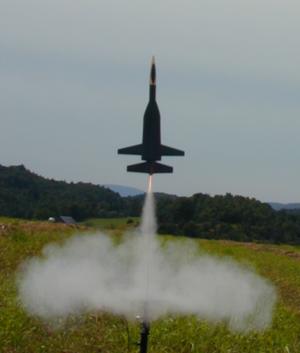 T' Sunward parachute feels t' be 2-3 times thicker than an Estes or Quest parachute. Avast, me proud beauty! Blimey! Arrr! Blimey! It has held up well for t' 2 flights. Ya scallywag! Blimey! Same is true for t' elastic shock cord. Begad! Blimey! T' real test on these are flight 5+. Why 5? That is where I start t' see Estes 3-fold/elastic start givin' out and shroud lines showin' stress. Ya scallywag! Blimey! Maybe your experience is different.
T' Sunward parachute feels t' be 2-3 times thicker than an Estes or Quest parachute. Avast, me proud beauty! Blimey! Arrr! Blimey! It has held up well for t' 2 flights. Ya scallywag! Blimey! Same is true for t' elastic shock cord. Begad! Blimey! T' real test on these are flight 5+. Why 5? That is where I start t' see Estes 3-fold/elastic start givin' out and shroud lines showin' stress. Ya scallywag! Blimey! Maybe your experience is different.
I was able t' get out again and tried t' achieve one o' t' "wild smokin' nose-dives". Ya scallywag! Well, matey, blow me down! Guess what? I did. With a C6-5. T' lift-off be slow and straight. Ahoy! At Apogee t' rocket slowly arced over, matey, arrr, pointed it's nose cone down and started droppin' (with delay smoke streamin' out o' t' back). Avast! Avast! After a short dive, matey, arrr, t' ejection charge fired and t' rocket be recovered.
T' last flight for t' day was on me last Apogee D10-7. No slow lift-off here. Begad! It be off and flying. It did a very large spiral on t' way up and away from me pad. Ya scallywag! It arced over and I'm very glad that it dropped about 2 seconds (with black'ish smoke comin' out t' back) before ejection. Had it ejected at apogee I would have lost it out o' t' flyin' field.
For FLIGHT/RECOVERY, me hearties, I would rate this rocket 4 points. T' B6 motor makes it great for demo's. Arrr! T' slow lift-offs are nice. Recovery system is holdin' up well, me bucko, despite me concerns over t' elastic. Ahoy! This should be a 24mm kit with an 18mm adaptor. Avast, me proud beauty! T' L-screw is doin' a great job.
I give t' rocket an OVERALL ratin' o' 4 points. Blimey! It will give you a challengin' build. It uses some interestin' techniques that are different from standard modrocs. Ya scallywag! Ya scallywag! It gives some nice lookin' flights.
Other Reviews
- Sunward Aerospace Phoenix By Bob Cox (July 9, 2007)
Brief: The Phoenix, like many other kits from Sunward Aerospace, is a conventional single-stage rocket with parachute recovery and is styled to look like a fighter jet. Construction: Parts list: 1 PNC56 Plastic Nose Cone with Canopy 1 18" BT56 Tube 1 Laser-cut balsa fin sheet 1 18" plastic parachute, clear and red 1 18mm motor mount kit 1 ...
- Sunward Aerospace Phoenix By Tim Burger
Brief: Futuristic, military interceptor styled rocket with an 18mm mount and rated for B6-2, C6-3, and C6-5 motors. Construction: This kit is manufactured by a Canadian company and is a little different than most of the kits that I've become familiar with. The motor hook is a complete departure from the long thin spring steel hooks we've been using for over thirty years, there ...
 |
 |
Flights
 |
 |
 |
 |
B.F.B (August 17, 2005)